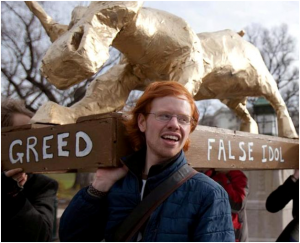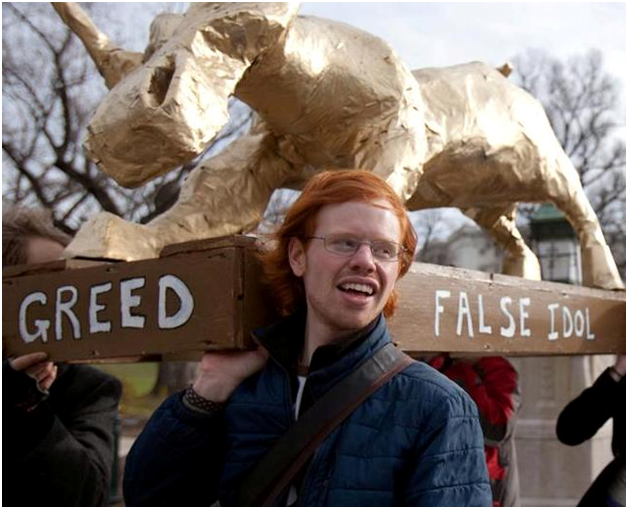What Do You Do? – Micah Bales
 Guest Director’s Note: Micah Bales and I were introduced to one another through Rev. Brian Merritt in the heat of OccupyDC. There was a lot of chaos in those days as to what any of us were there for. Along with Micah, Brian and I were amazed at the faith and commitment of such young people who were there not out of just anger but out of faith. And people there deserved a pastor. And I needed to know how to be their pastor. Micah, along with many others, were incredible teachers for me.
Guest Director’s Note: Micah Bales and I were introduced to one another through Rev. Brian Merritt in the heat of OccupyDC. There was a lot of chaos in those days as to what any of us were there for. Along with Micah, Brian and I were amazed at the faith and commitment of such young people who were there not out of just anger but out of faith. And people there deserved a pastor. And I needed to know how to be their pastor. Micah, along with many others, were incredible teachers for me.
When people ask me what I do for a living, I always feel awkward. Partly, this is because I have several part time jobs, each one quite different from the other. Digital strategy. Technical writing. Carpentry. It’s hard to give a simple and succinct answer to the what-do-you-do question. I usually feel like I’m just reciting a list of unrelated jobs.
It’s hard to know whether I’m even answering the question. When someone asks me what do you do, my answer is expected to be about my employment status, but we all know that the question is a lot deeper than that. “What do you do?” is about identity and purpose. It is our way of asking others, what are you really all about?
The easy answer to this question is to list off the ways in which I earn money, which is how I normally respond. I give a socially acceptable answer, the equivalent of fine, how are you doing? But when I rattle of a list of my paid activities, this doesn’t really tell you much about me.
What do I do? My true calling is to make myself available to the movement of the Holy Spirit. My life’s work is to walk in the way of discipleship with Jesus, and invite others to do the same. My God-given purpose is to encourage new leaders, new communities, and new networks of women and men who are ready to apply the gospel to the whole of our lives and relationships. I am a community organizer in the way of Jesus.
This calling has led me into many unexpected situations and relationships. I was caught off guard, for example, when, in the fall of 2011, I sensed God directing me to participate in the Occupy Wall Street demonstrations in New York. I was even more astonished when I felt the Holy Spirit nudging me to help organize Occupy DC on K Street. At first, there were seven of us; we met for the first time the night before the start of the encampment. The next day, there were dozens of us; we gathered for our first General Assembly in the cold, wind and rain. Before long, there were many hundreds of us, marching in the streets and raising a ruckus about economic injustice.
All of this was possible only because “what do you do?” was not our first priority. That fall, I knew what it meant to be set aside by God for an effort that would overwhelm any attempts to keep up appearances. In the midst of the crowds, with no job title or institution to define me, I had nothing to lean on but the witness of Scripture, the guidance of the Holy Spirit, and the faithful few whom God sent to walk with me.
I find it hard to bring these kinds of stories up in casual conversations at social events. It’s easier to take cover behind my paid work than to talk about the way that Christ is alive and active in my life and in the communities I serve. It’s easier not to talk about the heart and soul of who I really am.
Maybe it’s that I’m afraid of sounding preachy. Who am I to get on my soapbox about what the gospel is, what the Holy Spirit can do, and the power of Jesus to liberate and guide? For those who have not had this same experience, I might sound arrogant or ridiculous. I’m afraid of getting the Big Lebowski response: Yeah, well, that’s just your opinion, man.
Even for those who have experienced what I’m talking about, I wonder whether speaking about it is too deep for casual conversation. For many folks today, our faith is very personal. Most of us are more likely to talk about sex than our experience of God. It feels less risky to talk about our jobs and personal ambitions than it is to share about the love and power of Jesus.
Yet, despite all my reservations, it feels important to talk about the beauty and power that I have seen. I need to remain awake to the possibility that the next great opening might be just around the corner. Having experienced what it’s like to be caught up in the flow of Christ’s decisive action in the world, it’s hard to go back to resumé-building and material accumulation.
Fortunately, I don’t have to. God is giving me the opportunity to live into a ministry that doesn’t have an easy, socially acceptable name. The Spirit has knit a calling into the very fabric of my life, a purpose that draws me into the uncomfortable places. Like it or not, I am compelled to go where new things are growing. I am a community organizer in the way of Jesus.
In the years since Occupy, the Spirit has continued to guide me in laying the groundwork for a more peaceable kingdom – a more loving, just and Christ-like society. As we move beyond the euphoria of mass demonstration, I sense a call to gather communities where God is experienced as a living reality, where we are invited into restored lives in the deep love that breaks down inequality.
While the big-picture work of policy advocacy is important, I don’t sense Christ calling me to focus on that right now. Rather, this moment seems like a time of quiet cultivation: preparing the ground, planting and watering, pruning and fertilizing. I can sense in my bones that a great harvest is coming, but there’s a lot of slow, unglamorous work that lies ahead of us in the meantime. Most of all, this ministry is one of abiding in ambiguity. I don’t know where it all leads, but Jesus is gathering a people to walk with him, and I want to follow. That’s what I do.
It’s tough to endure in this holy uncertainty. Regardless of any pious words we might have heard to the contrary, following Jesus can be scary, confusing and humiliating. Yet, as Jacob learned wrestling with the angel, our struggles may offer a special blessing. I suspect that the ambiguity of my life provides more space for others to engage me with fewer assumptions and hang-ups. I’m not the pastor that you can’t swear around. I can stand with you in the not-knowing, because I’m out on a limb myself. I have no idea what God is going to do next.
There’s nothing easy about this. I’m still trying to figure out how to talk about what I do in ways that are meaningful and approachable for others, whether they share my faith or not. Making sense of this strange calling is hard enough for me to do for myself; helping others to understand is an even greater challenge.
Yet, I sense that this is exactly what God is inviting me to. I’m learning to be more open, honest, and authentic about who I am. I’m seeking more opportunities to answer what do you do in unexpected ways.
Jesus is the master of surprising answers. People constantly present him with questions meant to trip him up, yet he never takes the bait. He always engages with us on a deeper level. He looks past the question we ask and speaks to the yearning of our hearts. If someone asked Jesus, what do you do?, I’m almost positive he wouldn’t take the expected path of saying, I’m a carpenter. Jesus would hear the real question being asked – Who are you; why are you here? – and answer accordingly.
I pray that God will open the heart of the church – each one of us – to hear the real questions that our generation is asking. Most people aren’t terribly interested in our doctrinal squabbles, our fossilized heirloom institutions, or our debates about who’s in and who’s out. The world is asking us every day: Who are you; why are you here? May God give us the wisdom to hear the real question, and not respond with a churchy version of what do you do?
Imagine the power that would be unleashed if we had the courage and creativity to express the real reason we exist! What if we shared, through both words and actions, the good news that Jesus Christ gives us, and the life’s work that we are being called into? What if the next time someone asks, what do you do?, we choose to answer with a creativity and depth that reveals God’s presence and power in our lives?
How will you answer, “What do you do?”
Micah Bales is a founding member of Friends of Jesus, a new Quaker community in Washington, DC. A communications and digital strategist by trade, he is employed by Friends United Meeting – an international Quaker association. You can read more of his work at his blog, The Lamb’s War, or follow him on Twitter.

